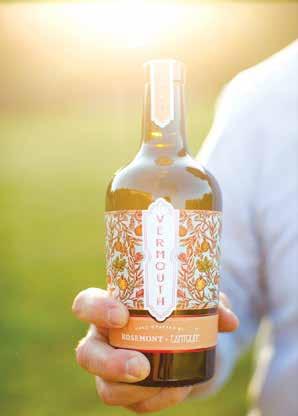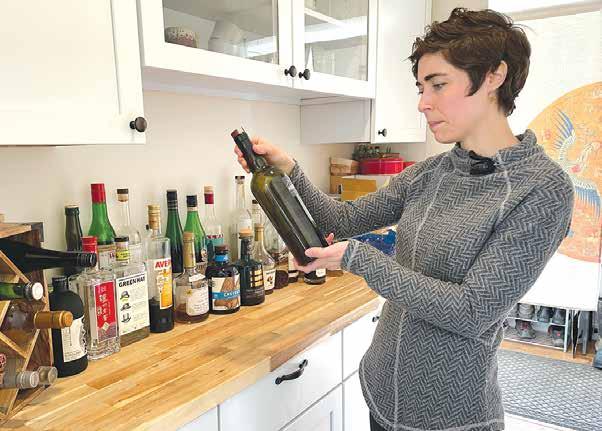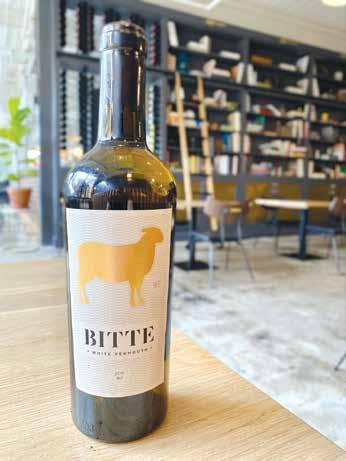
5 minute read
Grapevine
Mixing It Up With Locally Crafted Vermouth
Photo by Sara Petras
Saying Virginia is known for its craft beverages is an understatement. The state hosts almost 300 wineries, over 200 breweries, roughly 40 distilleries, at least 30 cideries, and nearly a dozen meaderies. But did you know we make our own vermouth as well?
If there was ever a beverage that’s misunderstood, it’s vermouth. It’s not quite a wine, but not quite a spirit either. Most people think of it as a cocktail mixer (think Negronis and Martinis) or aperitif, but vermouth can be enjoyed on its own.
Even defining vermouth is becoming difficult as American producers become more creative in their choice of botanicals. Virginia vermouths are equally diverse.
So What’s A Vermouth?
Put simply, vermouth is an aromatized (flavored with spices, herbs, or other florals) fortified wine. It likely started as a medicinal tonic, as the beverage’s botanical qualities made the medicine go down more easily. The alchemists who made the first vermouths must have realized they were on to something, so a trend began.
Modern vermouth includes a wine base, bittering agent, spirit for fortification, and a sweetener. While traditionally made with wormwood (vermouth is actually the French pronunciation of the word wermut, the German name for this herb), the term vermouth is increasingly applied to any aromatized wine. However, purists would argue that without wormwood, it may be an aromatized wine but it’s not a vermouth.
Vermouth’s popularity is in large part due to its versatility. It provides cocktails an array of flavor profiles without requiring the bartender to add more ingredients. When you narrow it down, there are three major types of vermouth; sweet (red), dry (white), and blanc.
Sweet vermouths are usually paired with richer drinks like bourbon or rum and are a component of Manhattans and Negronis. Dry vermouth goes with lighter spirits. Blanc vermouths are typically a halfway point between the red and white versions, and may be sipped straight.
Virginia Vermouths Gaining Traction
Only a handful of vermouths are made in Virginia, usually by local winemakers. This small scale production means local ingredients play a prominent role, giving mixologists something new and exciting to play with. Virginia vermouth-makers can also boast that these are craft products, with a quality and complexity that allows them to be enjoyed on their own or used in a cocktail.
Kelly Allen and Andrew Napier of ARTEMISIA FARM AND VINEYARD are amongst this small group of vermouth-makers. Kelly explained, “We want to capture Virginia’s terroir as an abstract essence.” While Artemisia’s current focuws is their CSA farm, making bitters, sparkling, and vermouth is a growing project. Members of their Patreon even receive a small sample of what’s to come.
Vermouth wasn’t one of the products in ROSEMONT VINEYARDS & WINERY‘s original business plan, but Justin Rose loved the idea of making something new.
“It was really our distributor’s idea. We had some white wine we hadn’t used. But our distributor asked us to make one so we jumped at the idea. We’ve partnered with CAPITOLINE, which has the expertise on the botanicals we should use and how.
Ours is a little different. We use birch bark instead of wormwood as a bittering agent. Traditionally the botanicals are infused into the wine, but we use the botanicals in the brandy first then blend it. We also use local honey instead of sugar as a sweetener, which gives it a nice aromatic profile. So we’ve tried to keep it regional and local.

Rosemont Vineyards partnered with Capitoline for their vermouth which uses birch bark as a bittering agent. Kelly Allen of Artemisia Farm.

It’s something that we’re ramping up from a fun little side project to something that now has turned into a bigger project. We’ve used it on the rocks as an aperitif, or occasionally as a gin and tonic.”
FOR FLYING FOX VINEYARD, vermouth fits into the winery’s profile as a place for winemaker Emily Pelton to test her more experimental ideas. Their vermouth was inspired by Emily’s exploratory trip to Portugal where she noticed how many people were enjoying it as a drink as opposed to a mixer.
Co-owner George Hodson said that led to a focus on developing a more sippable drink, where the intensity was dialed back so not to be as sweet or bitter, but more in the middle. ”Local botanicals are the key,” George explained. “It was lots of trial and error; especially learning when we add these bittering agents.” Even the brandy is derived from their own grapes.
Emily’s formula was a hit. While a large portion goes to the local bar scene, over half of their production is sold at the winery. George explained this format, “fundamentally flips the vermouth world. More people are getting used to sipping it on its own.”
Flying Fox makes four vermouths, each with its own seasonal flavor profile. While they make over 1000 bottles a year, they’ve continually ramped up production to meet growing demand.
Dr. Joy Ting is no stranger to experimentation. As the head enologist of the Winemaker’s Research Exchange, she works with winemakers from around the state to identify areas of practical research. She also makes a number of smallbatch wines under her own eponymous label, and recently partnered with the Wool Factory to produce a vermouth for their restaurant, BROADCLOTH.
In explaining how she got into making vermouth, she exclaimed, “It’s a hidden gem! As a winemaker we often don’t get to try multiple things but with vermouth we get to play around with it.” Her vermouth uses brandy from a local distillery, made in a dryer style but with some sugar to offset the bitterness.
Broadcloth was a natural partner because of their bar program and focus on using local, seasonal Virginia ingredients. But her take as to why Virginia vermouth is taking off is due to how Virginia winemakers are by nature focused on small batch, craft creations where they can focus on the small details.

Matthew Fitzsimmons is a blogger who has visited nearly every winery in Virginia – most of them twice. Track his progress at https:// winetrailsandwanderlust.com/.
real people. earth friendly. fabulous wines.
OPEN THURSDAY THROUGH MONDAY 11-5 PLEASE CALL FOR RESERVATIONS FOR GROUPS OF SIX OR MORE FAMILIES WELCOME FROM 11-2. 21 AND OLDER ONLY FROM 2 PM TO CLOSE 15669 Limestone School Rd • Leesburg, VA 20176 703.771.1197 • fabbioliwines.com • info@fabbioliwines.com










